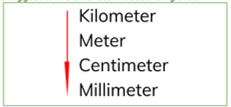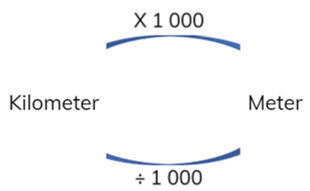|
Units of Length
In primary school syllabus, pupils are being guided to understand and comprehend the relationship between units of length. From the smallest unit, millimeter to the biggest unit, kilometer. Pupils always forgot the relationship between unit of length because they do not discern the connection between these units and way to memorize and understand it.
Using Pattern
By using pattern, pupils are being guided to understand the relationship between these units. To do this, arrange the unit from the biggest to the smallest in descending order.
|

Diagram 1: Arrange the units from the biggest to the smallest.
|
Show to the pupils that the next (bottom) unit relates to the previous unit by making it in the form of equation.
KILOMETER = METER
METER = CENTIMETRE
CENTIMETRE = MILIMETRE
|
|

Diagram 2: Help pupil to relate the former unit with the next unit.
|
Show to the pupils that the units are connected by complete the equation. Show the multiple of 10 in ascending order in each equation as follow. Emphasizes the pattern seen from the Diagram 3.
1 KILOMETER = 1000 METER
1 METER = 100 CENTIMETRE
1 CENTIMETRE = 10 MILIMETRE
|
|

Diagram 3: By doing this pattern, it helps pupils to understand the relationship between units of length and memorize it.
|
Using Diagram
After pupils discern the relationship between units of length, use diagram to help pupil understand the connection between units in each equation. Enhance to the pupils that big unit must be placed on the left side while small unit must be placed on the right side.
|

Diagram 4: Use this diagram for the rest of the unit of length if the pupils want to convert it.
|
Emphasize to the pupils that from big unit to the small unit, they must multiply and from small unit to the big unit, they must divide. To help pupils understand and retain this skill, give them some other examples. Ask them to convert from centimeter to millimeter or from millimeter to centimeter.
|
 Login
Login My Account
My Account










